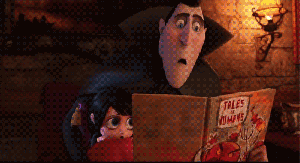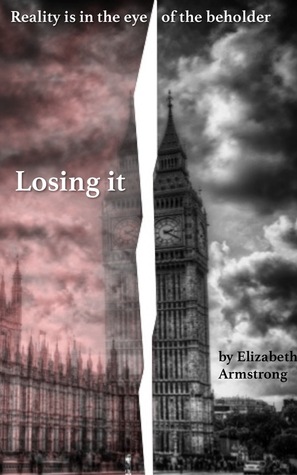Tags
Elizabeth Armstrong, horror, humor, Losing It, review, Rosie Amber's Book Review Team, urban fantasy
Is it urban fantasy or horror?
I love urban fantasy. I write urban fantasy. Horror? Not so much. As I read Elizabeth Armstrong’s debut novel Losing It, I was trying to figure out which genre it belongs in. Especially for some of the darker urban fantasy tales, the line can be a fine one indeed. I started by thinking about a few of my favorite characters from the darker side of urban fantasy – Jim Butcher’s Harry Dresden, Patricia Briggs’ Mercy Thompson, Laurel K. Hamilton’s Anita Blake, maybe even Ilona Andrews’ Kate Daniels.
In her essay for The Creative Penn, author Emma Newman says “Urban fantasy has been defined by the places in which the fantasy (magic and or strange creatures, usually) is set – i.e. the urban environment. It gives flexibility in terms of the time period; the city could be in the Victorian, Tudor, post-American civil war – whenever. As long as the fantasy is rooted in the city, it’s urban fantasy.” But she also quotes author Paul Cornell, who describes urban fantasy as “Horror in which the characters will probably survive.”
In my urban fantasy world, I think it’s a combination of the two ideas. I’d say the following are three things that separate horror from dark urban fantasy:
 Of course, in urban fantasy there doesn’t have to be any horror at all, or at most very little, as in the humorous vampires and shifters of Molly Harper, Katie MacAlister, or MaryJanice Davidson’s urban fantasies. But if you’re going for dark urban fantasy, then you want your protagonist to be in some way as strong as the villain (say a wizard like Jim Butcher’s Harry Dresden, a witch like Patricia Briggs’ Mercy Thompson, or a magic-wielding mercenary like Ilona Andrew’s Kate Daniels), so it doesn’t go off the rails into teens-pureed-into-ketchup territory.
Of course, in urban fantasy there doesn’t have to be any horror at all, or at most very little, as in the humorous vampires and shifters of Molly Harper, Katie MacAlister, or MaryJanice Davidson’s urban fantasies. But if you’re going for dark urban fantasy, then you want your protagonist to be in some way as strong as the villain (say a wizard like Jim Butcher’s Harry Dresden, a witch like Patricia Briggs’ Mercy Thompson, or a magic-wielding mercenary like Ilona Andrew’s Kate Daniels), so it doesn’t go off the rails into teens-pureed-into-ketchup territory.-
In most urban fantasy, you need a hero who is not quite regulation-issue human. If the protagonist is a regular person—like say, Jonathan Harker, the hapless solicitor hired by that Transylvanian Count, or [insert any Stephen King plotline]—then they are helpless against dark forces that overwhelm them—truly the stuff of horror.
- Horror doesn’t necessarily have to involve the supernatural. You can just have a really pissed off shark, or maybe some cray-cray with mom and shower issues.
So you can have urban fantasy without the horror, and you can have horror without the fantasy. But when you have both, what is the point which separates dark urban fantasy from horror? Is it some objective measurement of gallons of O-positive spilled per page and a lifelong fear of hotel showers? I think the answer is that in most horror, it’s enough that the main characters survive Daddy coming for them with an axe. But in urban fantasy, they catch the ghost who drove Daddy crazy and charge him with income tax evasion, bring hot dish to the ghost’s mama, and maybe end up married to the ghost’s sister.
Blurb
 Kate Winters is more than ready to chalk up the sudden invasion of trolls and knife wielding pixies to an inconveniently timed mental breakdown, after all with a serial killer on the loose it’s not as if London is short of real monsters.
Kate Winters is more than ready to chalk up the sudden invasion of trolls and knife wielding pixies to an inconveniently timed mental breakdown, after all with a serial killer on the loose it’s not as if London is short of real monsters.
Still reeling from the loss of her husband and a long way from her home in San Francisco, Kate doesn’t have any plans beyond just getting by until a misguided attempt to help a young girl with her own apparent mental health issues leaves her standing between a murder suspect and the police. Nothing is what it seems as she is forced to learn the difference between murder and sacrifice.
This isn’t like in the fairy tales, the Incubus has emotional issues, the only angel in the picture isn’t entirely sure that she counts as one of God’s children, the nuns aren’t vindictive and nightmares can come to life.
 My Review: 3.5 stars out of 5
My Review: 3.5 stars out of 5
In Losing It, we meet Dr. Kate Winters at the point where she really wonders if she’s…well, losing it. Since her husband’s death (which she can’t remember), she’s been seeing everything from pixies and imps to bridge trolls. But it’s the Grey Man of her dreams who really terrifies her. As Kate is pulled ever-further from her past life of a Silicon Valley scientist, she wonders which is worse—seeing the unbelievable creatures all around her because she’s crazy, or because they are really there. Then she meets a young girl who sees the monsters too, and realizes that she has to help her. But that help plays out against the serial killer terrorizing London even as the threat gets closer to Kate and the traumatized young girl she’s trying to help.
I thought the premise was terrific and was really looking forward to the book. But for me, the plot seemed to stagger into peculiar areas. Returning from Silicon Valley after her husband’s mysterious death, Kate moves into an older London apartment. Her brother has disappeared, and she is determined to find out why. Only… she doesn’t. There is almost no further mention of him. Instead, her building seems to be occupied solely by supernatural creatures, from miniature imps wielding needle-sized swords to a succubus and a recalcitrant giant. Nuns, Russian mobsters, and a variety of police (both supernatural and non) turn up on every page until I had trouble keeping the giant cast straight. Part of my problem is that I didn’t feel that I ever understood what Kate was after, so it was difficult to get attached to her and thus to the other characters. And there was just SO much supernatural stuff going on! I often enjoy the fun of seeing deities and supernatural creatures from a variety of cultures and pantheons interacting, but the author made such a huge point about religion and belief that I was a bit uncomfortable seeing Ganesh and a fallen angel and the devil and fey all mixing it up, with a dash of time travel and a dead husband’s ghost thrown in, plus a strange affinity for water because why the heck not…
I realize that all this sounds a bit grim, but actually Elizabeth Armstrong’s writing style (except for a handful of edit fails) is impressive. She has a talent for the unusual turn of phrase that makes you stop and think. “She begins to laugh and perhaps because the only choice we do have left is how we fall, I find myself joining in.” She also has an offbeat sense of humor that provides relief from the increasingly bloody and violent action. For example, Kate’s phone rings while she’s standing in the dark with the young girl she’s trying to protect and the horrifically tortured and murdered body of the killer’s latest victim. It’s her entire family, singing Happy Birthday for her thirtieth birthday. Her mother asks if she’s trying to hang up the phone because she dreads turning thirty. “I know Mum,” I tell her more cheerfully, because technically I don’t turn thirty until midnight and I could be dead by then.”
In trying to give a rating, I’m torn. The quality of the writing, the setting, and the unexpected flashes of humor were terrific. I lost the thread of the plot as it looped around the middle of the book, but it was resolved in a nerve-wracking denouement. My biggest objection is that the two questions we started with—what happened to Kate’s husband Nick, and where is her brother Justin—remain unanswered. I think she just squeaked in on the dark side of urban fantasy, despite the amount of blood and gore. With all that said, I’d give Losing It three and a half stars, and look for more from Elizabeth Armstrong.
 I reviewed Losing It for Rosie’s Book Review Team.
I reviewed Losing It for Rosie’s Book Review Team.
*I received this book for free from the publisher or author in exchange for an honest review. This does not affect my opinion of the book or the content of my review.
Book Title: Losing It
Author: Elizabeth Armstrong
Genre: Dark Urban Fantasy
Length: 324 pages
Publisher: Amazon Digital (December 12, 2014)
Contact and Buy Links:
 Elizabeth Armstrong is a science nerd, as proven by the fact that she has been known to make Undergraduates fall asleep by just talking at them and then somehow ends up talking about the same topic after work in the pub. To try and make people think she’s a little more interesting she also travels extensively and has developed a liking for sports that don’t get covered by normal travel insurance policies. Although this should not be taken to mean that she is actually any good at them, in fact she has often been referred to as the living embodiment of Murphy’s Law by friends and colleagues who are continually surprised when she turns up in one piece. So far writing has only resulted in a number of papers cuts and her falling out of a luggage rack.
Elizabeth Armstrong is a science nerd, as proven by the fact that she has been known to make Undergraduates fall asleep by just talking at them and then somehow ends up talking about the same topic after work in the pub. To try and make people think she’s a little more interesting she also travels extensively and has developed a liking for sports that don’t get covered by normal travel insurance policies. Although this should not be taken to mean that she is actually any good at them, in fact she has often been referred to as the living embodiment of Murphy’s Law by friends and colleagues who are continually surprised when she turns up in one piece. So far writing has only resulted in a number of papers cuts and her falling out of a luggage rack.


Ha, I like the author’s bio. She sounds like a fun lady, which also seems to appear in her writing!
LikeLiked by 1 person
I know! That bio would make a great character sheet for a lead. Hmmm…
LikeLiked by 1 person
You know, usually it takes a glowing review from someone to make me want to read the book. But then there is you. You review books and it doesn’t matter that the word horror is involved (just hide me under the covers now) and there’s not a full complement of stars. I still want to read it. (Making note, if ever write book ask Barb very nicely to review…)
LikeLiked by 2 people
Please, please, please write that book! I know…when I had four kids running around, it was really hard to write. (I wrote my column between midnight and 2:00AM on nights when nobody was barfing.) I can’t imagine how you fit in everything you do. But you’re an absolutely terrific writer, and I know someday that book will be waiting for me to read. (Um… I kind of hope it isn’t horror though.)
Can’t wait!
LikeLike
You are very kind! While I’m not sure what I would write a book about if I ever do think of something you can bet it’s NOT going to be horror! 🙂
LikeLike
Thanks Barb, love the discussion on horror and urban fantasy, when I read this I really enjoyed the urban fantasy side of it. I was thinking about times when you face a nasty aggressive person and one way to cope is if think of them naked or just wearing their undies. For Kate, she could see creatures standing over their shoulder or pixies running up their trousers. It took a couple of reads of the ending, but I think I got what happened to her husband, but I wanted to know lots more about the Aunts and her brother too.
LikeLiked by 1 person
You’re a MUCH more careful reader than I am. [heads back to read up on Noah again…]
LikeLike
Thank you, Barb.
Ditto to everything that Jessie said.
Your explanation of horror/fantasy has interested me in a genre that I’ve never had the slightest inclination to read before!
LikeLiked by 2 people
Well, I think I’m still not ready for the slasher movies, but real horror—done right—is all about the suspense and the atmosphere, I think.
LikeLike
Reblogged this on Barrow Blogs: .
LikeLike